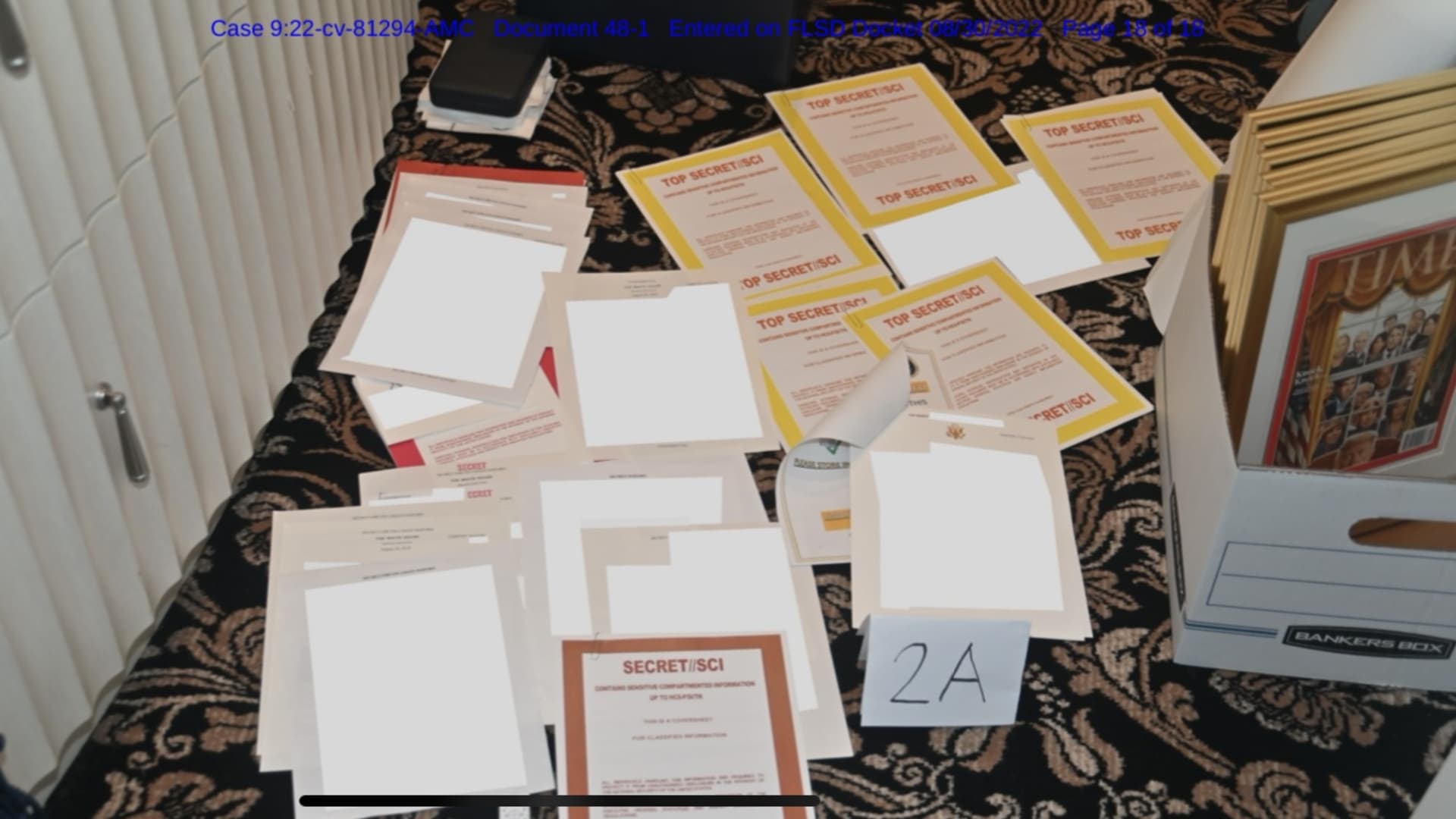FBI agents found four dozen empty document folders marked “CLASSIFIED” during their raid last month of former President Donald Trump‘s residence at his Mar-a-Lago club, a newly unsealed court file revealed Friday.
Agents found 43 of those empty folders marked classified in Trump’s office, according to the Department of Justice’s inventory of the seized items, filed in U.S. District Court for the Southern District of Florida.
The remaining five empty folders with that marking were found in containers in a storage room.
The FBI also found another 42 empty folders marked “Return to Staff Secretary/Miliary [sic] Aide,” during the Aug. 8 raid, which was authorized to search for government documents removed from the White House when Trump left office in Jan. 2021, the filing said.
Twenty-eight of those empty folders were found in Trump’s office, while another 14 were in a storage room elsewhere, the document shows.
And FBI agents found more than 10,000 government documents and photographs without classification markings, the filing shows. Among those were hundreds of photos and news articles, along with gifts, clothing, and books.
The bombshell revelations raise the prospect that the DOJ has not yet recovered the documents that would have been in the empty folders.
The DOJ is investigating possible crimes related to the removal of those and other government documents from the White House when Trump left office in Jan. 2021.
By law, such records must be turned over to the National Archives and Records Administration.
On Tuesday, the DOJ said in another court filing that more than 100 classified documents were found at Mar-a-Lago. That property receipt noted that the government seized 11 sets of classified documents, as well as an executive grant of clemency regarding Roger Stone, a longtime Republican operative and Trump confidant.
The previously disclosed property inventory of items seized lists multiple U.S. government documents with “confidential,” “secret” and “top secret” classification markings.
The detailed inventory made public Friday was one of two court filings related to the FBI raid that were ordered unsealed by Judge Aileen Cannon after she conducted a hearing Thursday on a request by Trump’s lawyers to appoint a third-party to review the seized records.
The other document unsealed Friday is titled, “Notice of Investigative Team of Status of Review,” and notes that the criminal probe did not end with the raid.
It was signed by Miami U.S. Attorney Juan Gonzalez, and Jay Bratt, the chief of the counterintelligence and export control section of the national security division of the Justice Department.
“The seized materials will continue to be used to further the government’s investigation, and the investigative team will continue to use and evaluate the seized materials as it takes further investigative steps, such as through additional interviews and grand jury practice,” that notice says.
“It is important to note, ‘review’ of the seized materials is not a single investigative step but an ongoing process in this active criminal investigation,” the document says.
Trump’s spokesman in a series of tweets about the inventory of the seized items again criticized the raid.
“The new ‘detailed’ inventory list only further proves that this unprecedented and unnecessary raid of President Trump’s home was not some surgical, confined search and retrieval that the Biden administration claims, it was a SMASH AND GRAB,” wrote the spokesman, Taylor Budowich.
“These document disputes should be resolved under the Presidential Records Act, which requires cooperation and negotiation by NARA [National Archives and Records Administration], not an armed FBI raid,” Budowich added.
Trump in a lawsuit filed in late August asked Cannon to appoint an independent watchdog, known as a special master, to review the items seized in the search before the DOJ is allowed to continue using the documents in the investigation.
Trump’s lawyers have said a special master could check to see if some documents would be prohibited from being used in the probe because they are protected by either attorney-client privilege or executive privilege.
The DOJ has opposed the appointment of a special master, saying that it would delay the investigation, and that Trump does not own the documents.
Cannon, during a court hearing in Florida on that dispute Thursday, said she will issue a ruling on the special master request in “due course.”
Cannon, a Trump appointee, previously shared her “preliminary intent” to grant Trump’s request for a special master. The judge suggested in Thursday’s hearing that she is still considering that appointment, news outlets reported.
